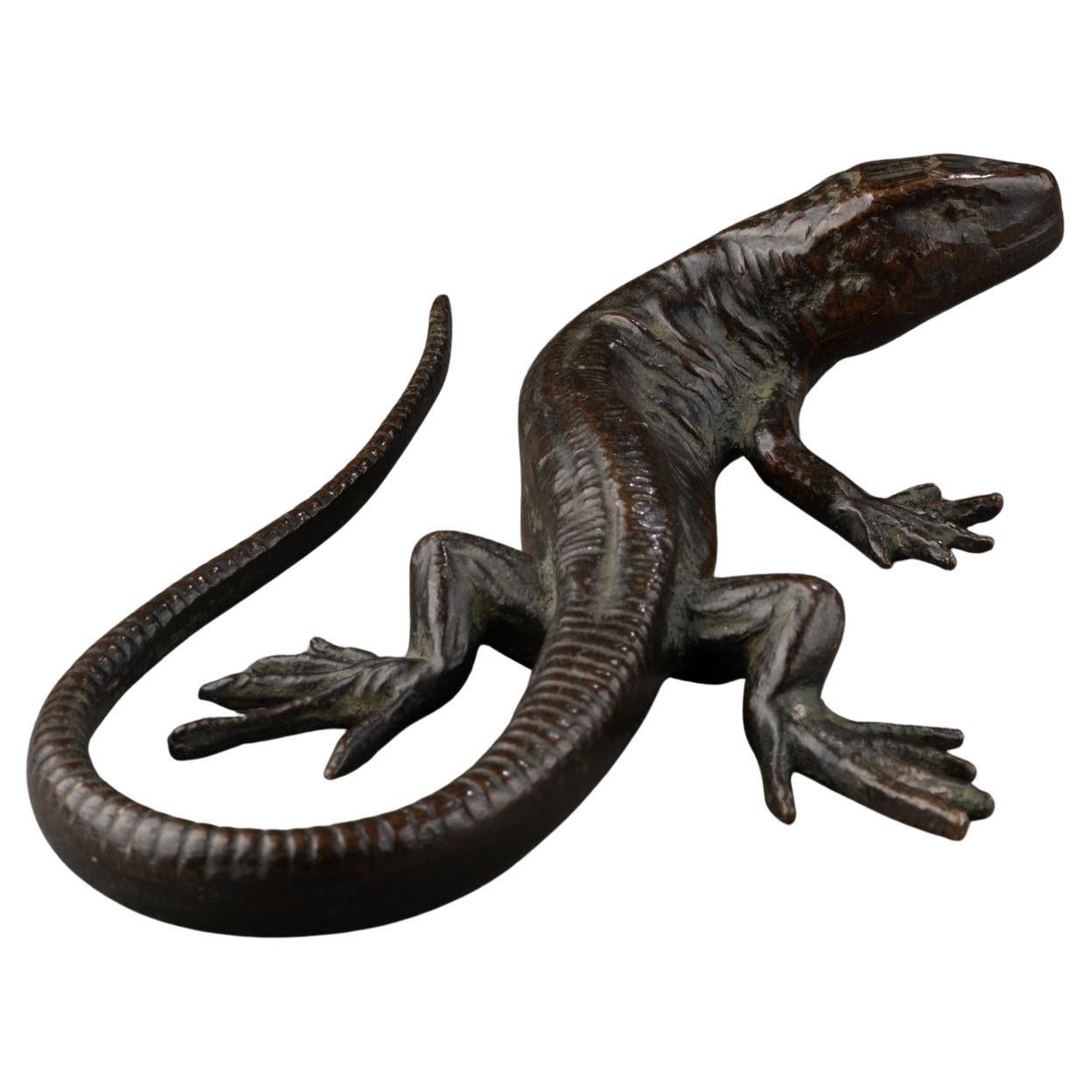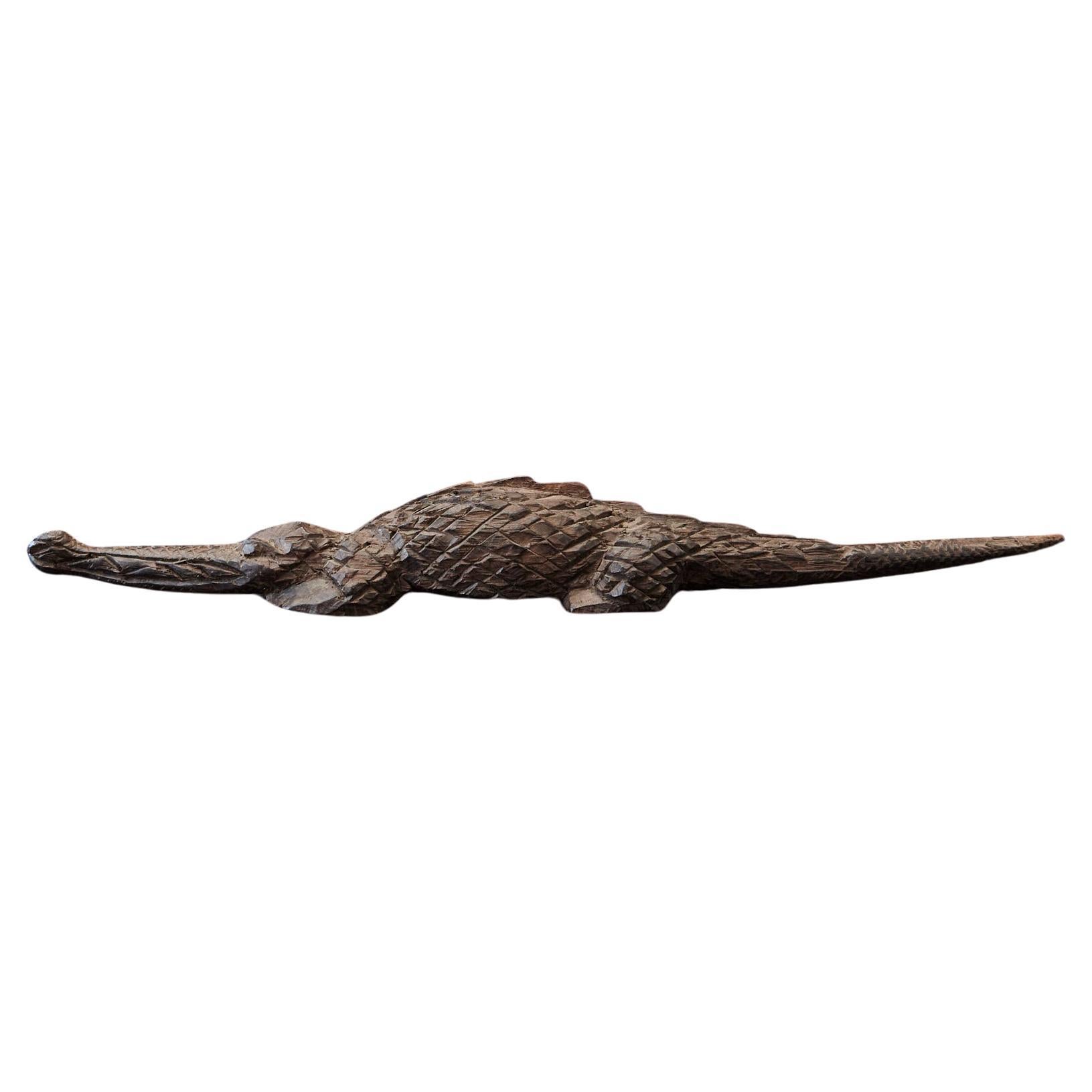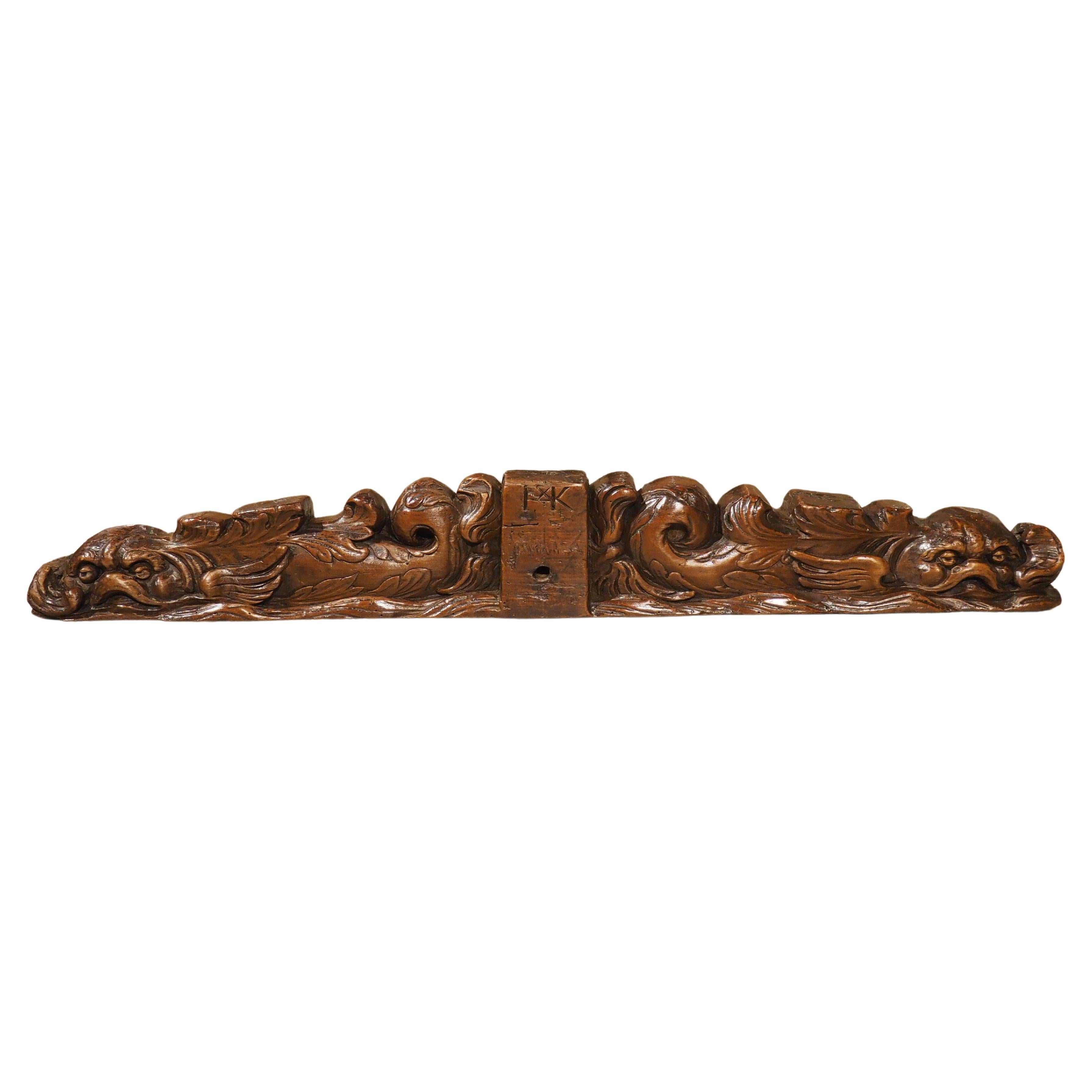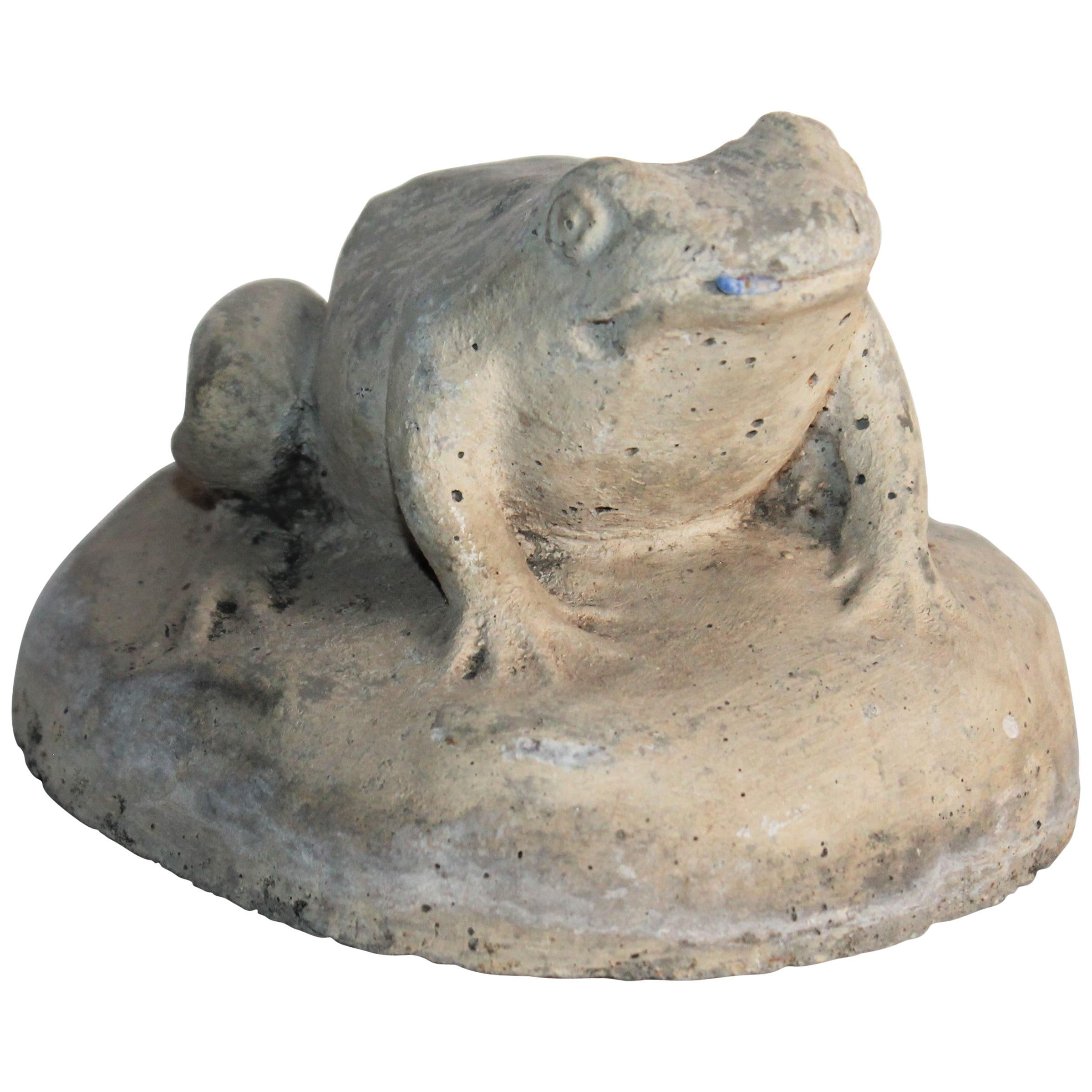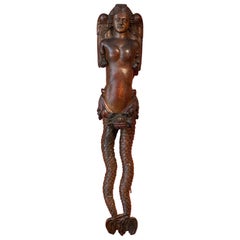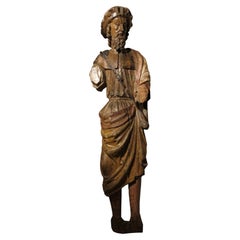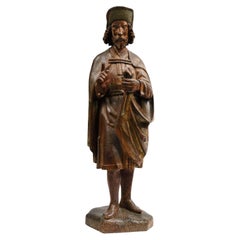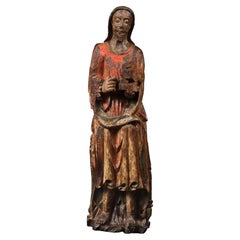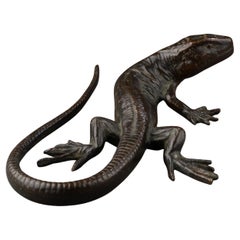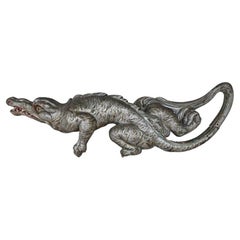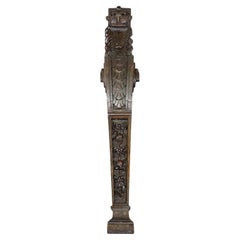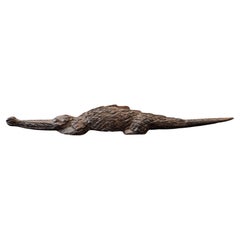Items Similar to Element of an Outdoor Carved Woodwork Showing a Salamander from a Normand House
Want more images or videos?
Request additional images or videos from the seller
1 of 5
Element of an Outdoor Carved Woodwork Showing a Salamander from a Normand House
$4,211.71
£3,118.15
€3,500
CA$5,831.41
A$6,366.51
CHF 3,337.70
MX$77,323.67
NOK 41,682.42
SEK 39,359.32
DKK 26,646.25
About the Item
This carved oak woodwork was probably placed on the facade of the house, close to the roofing framework of a Norman house. The sculptor had depicted the salamender frontview in a stylised manner. The scales and the neck fringes are particularly detailed. The head was in the direction of the floor.
According to the popular belief, Salamander was living in the fire, from which the animal found life and protection. It was the symbol of the fire guardians commissioned by God himself. The popular belief, as old as Aristotle writings, also says that the salamender could extinguish fire. Thus we can easily understand why it was chosen to be depicted on the facade of a house.
Moreover, Charles de Valois, duke of Angoulème (d. 1496) used the salamander in fire, as his emblem. His son, François I, king of France, kept this emblem and added NUTRISCO ET EXTINGOmeaning “ I feed and I extinguish’. We can see salamanders depicted on different royal palaces. In the city of Lisieux , we can see the “Salamander Mansion ” from the 16th century, where a carved woodwork Salamander is running on the roofing framework.
- Dimensions:Height: 43.31 in (110 cm)Width: 14.57 in (37 cm)Depth: 4.34 in (11 cm)
- Style:Gothic (Of the Period)
- Materials and Techniques:
- Place of Origin:
- Period:
- Date of Manufacture:Late 15th-Early 16th century
- Condition:Replacements made.
- Seller Location:Saint-Ouen, FR
- Reference Number:1stDibs: LU3115327268072
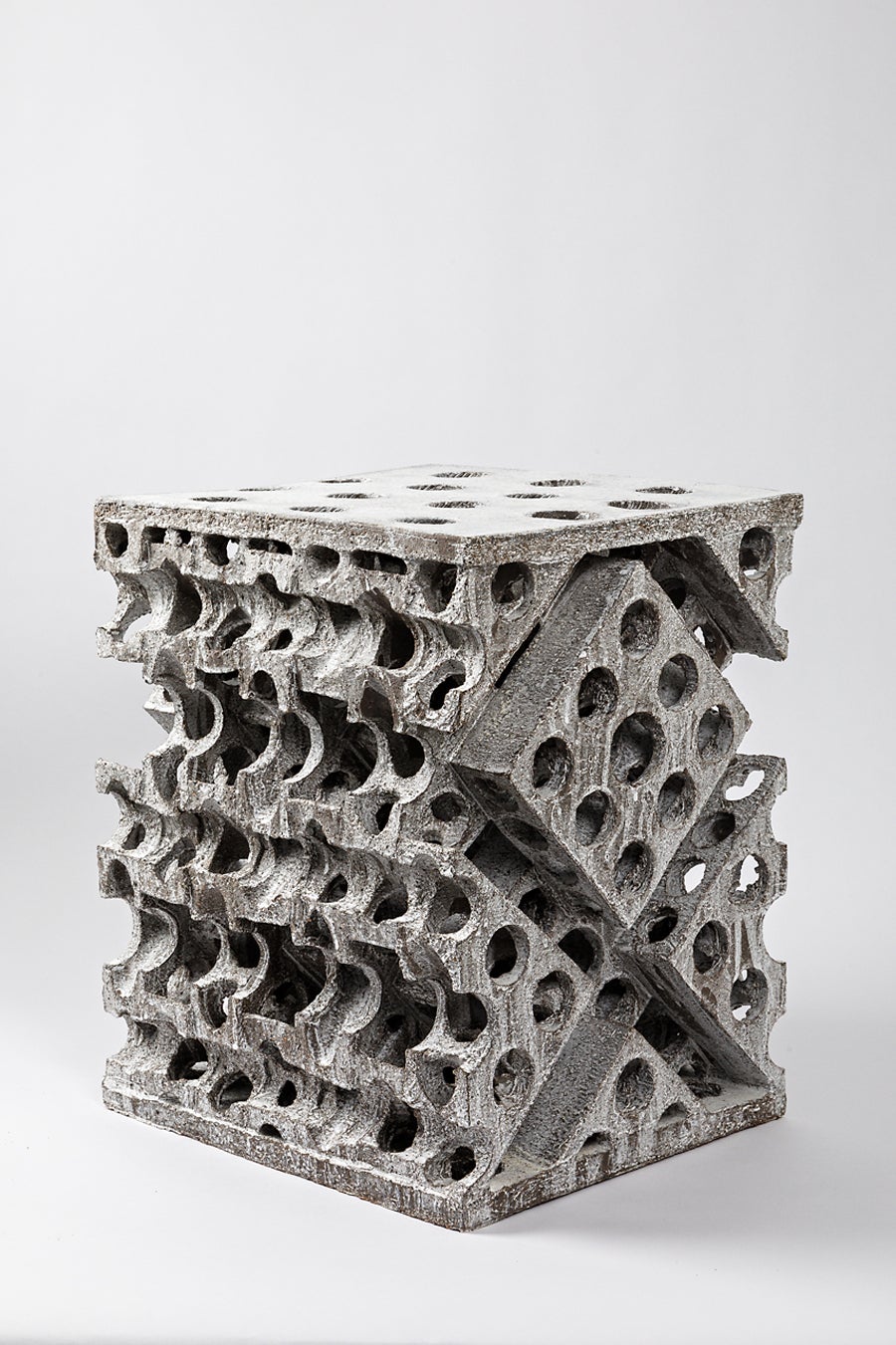
About the Seller
5.0
Vetted Professional Seller
Every seller passes strict standards for authenticity and reliability
Established in 2016
1stDibs seller since 2017
197 sales on 1stDibs
Typical response time: 3 hours
- ShippingRetrieving quote...Shipping from: Saint-Ouen, France
- Return Policy
Authenticity Guarantee
In the unlikely event there’s an issue with an item’s authenticity, contact us within 1 year for a full refund. DetailsMoney-Back Guarantee
If your item is not as described, is damaged in transit, or does not arrive, contact us within 7 days for a full refund. Details24-Hour Cancellation
You have a 24-hour grace period in which to reconsider your purchase, with no questions asked.Vetted Professional Sellers
Our world-class sellers must adhere to strict standards for service and quality, maintaining the integrity of our listings.Price-Match Guarantee
If you find that a seller listed the same item for a lower price elsewhere, we’ll match it.Trusted Global Delivery
Our best-in-class carrier network provides specialized shipping options worldwide, including custom delivery.More From This Seller
View All16th Century Southern Germany Carved Wood Bracket Depicting a Mermaid
Located in Saint-Ouen, FR
In Medieval Europe and even more during the early 16th century fantastic beasts could be found in Bestiaries, a literary genre close to poetry. A bestiary used the characteristics of...
Category
Antique 16th Century German Renaissance Animal Sculptures
Materials
Wood
15th Century Carved Wood Depicting Saint James
Located in Saint-Ouen, FR
The Saint depicted here is Saint James the Great.
James is the brother of St. John the Evangelist. Nothing is known of his activities after the Ascension...
Category
Antique 15th Century and Earlier French Gothic Figurative Sculptures
Materials
Oak
Carved Wood Depicting Saint Martin
Located in Saint-Ouen, FR
Carved wood depicting saint martin
Origin : Germany
Period : 15th century
Measure: Height : 85 cm
Wood
Polychrome remains
Good state of conservation
Collection number on the back 26757
Our partially polychromed Saint...
Category
Antique 15th Century and Earlier Figurative Sculptures
Materials
Wood
Wood Sculpture Depicting John the Baptist
Located in Saint-Ouen, FR
This wood scultpure showing fine traces of polychromy depicts John the Baptist, one the Old Testament’s last prophets and the first martyr of the New Testament. He is easily recognizable with the lamb he is carrying in his left hand. The way the artist has carved the face exudes a spiritual strenght inherited from previous centuries.
Description
Saint John the Baptist is depicted bare feet, seated in a hieratic manner. His elongated face is marked by a beard and a moustache. The straight nose and wide eyes indicate a Spanish origin. This asumption is reaffirmed by the Saint’s resigned expression.
His parted hair frames his face while uncovering his ears.
He wears a round collar red-orange tunic, draped onto the body and belted at the waist. A flap of his green coat covers his knees and falls down in stylized pleats.
Following iconographic rules Saint John the Baptist is pointing with his right hand the lamb seated...
Category
Antique 15th Century and Earlier Spanish Gothic Figurative Sculptures
Materials
Wood
Carved Wood Depicting the Resurrection of Christ
Located in Saint-Ouen, FR
Carved wood depicting the resurrection of Christ
ORIGIN : SOUTHERN NETHERLANDS, ANTWERP
PERIOD : EARLY 16th CENTURY
Height : 67.5 cm
Len...
Category
Antique 16th Century Figurative Sculptures
Materials
Oak
Rare Renaissance Cabinet Richly Carved
Located in Saint-Ouen, FR
This rare Renaissance cabinet is richly decorated on the doors and drawers with carvings depicting the four seasons, and on the uprights and the entablature, alternating flower bouquets inlaid with mother of pearl. This is a beautifully conceived piece of furniture, representing a crowned portico with its entablature and cornice.
The upper body
Articulated separately in a ternary rhythm, as with the lower body, the upper part opens with two carved doors. The doors are framed by both the lateral uprights and the casing. There are cartouches carved into the casing in which mythological figures are depicted with flower bouquets.
On the doors:
On the right: Spring, a female figure crowned with a wreath of leaves, holding a basket full of flowers. She is wearing necklaces and bracelets on each arm, with drapery discretely wrapped around her body and is standing on a winged putti’s head. On each side are depicted a tree and a village with a steepled church. Above her head floats the three signs of the zodiac corresponding to the season: Aries, Taurus and Gemini.
On the left: Summer, a bearded man crowned with ears of corn and bearing armfuls of corn. He is standing on a similar winged putti, flanked by a tree and an ear of corn. The following three signs of the zodiac appear: Cancer, Leo and Virgo.
On the uprights and the central casing a number of smaller figures seem to represent virtues and vices that newly wedded couples should aspire to and avoid.
On each side, at the bottom of the uprights, there is a dog representing fidelity. Above, a lion embodies power, wisdom, and justice.
In between, on the left upright, there is a figure of noncombatant Athena wearing a helmet and holding a spear, an arrow pointing down and in her left hand, a shield, symbol of protective power. On the right upright, the goddess Venus controls the arrow of Cupid.
The iconography here acts as a clear reminder of the required virtues that both parts of a young couple need to fulfill: fidelity, power, wisdom and justice. For him, the goddess Athena focuses on the power. Whereas for her, it is Venus who shows how to control Cupid’s arrow.
On the central casing at the bottom, by way of contrast, there is a peacock, a symbol of pride and at the top, a monkey representing lust and mischief. In between, a woman holding a chain and a cup full of precious stones while on the floor sits a half empty opened casket. This can be interpreted as a symbol of extravagance.
Above, the entablature, decorated with male figures resting on leaking urns, may symbolize the passing of time. They are flanked by two consoles decorated with acanthus leaves and separated by flower bouquets (inlaid with mother of pearl). Finally on top, a cornice acts as a crown for the piece of furniture.
The lower body
The moulded base stands on four round, flattened feet.
Represented on the doors:
On the left: Autumn, a stocky, naked man crowned with vine leaves, holding fruits in his right hand and with his left, picking a bunch of grapes from a climbing vine. Standing on a mound, he is surrounded by a vine and a hill, at the foot of which a man presses the grapes in a big vat after the harvest. Above the climbing vine appear the signs of Libra, Scorpio and Sagittarius.
On the right: Winter, an elderly man wearing a fur cloak...
Category
Antique 16th Century French Renaissance Cabinets
Materials
Walnut
You May Also Like
Bronze salamander - 17th century
Located in Bruxelles, BE
Bronze salamander
Italy, 17th century
Patinated bronze
4 x 17 x 10 cm
This finely cast bronze salamander exemplifies the 17th-century fascination with naturalistic forms and animal ...
Category
Antique 17th Century Italian Renaissance Animal Sculptures
Materials
Bronze
Rare Early 20th Century Hand Carved Fairground Dragon Ride Fragment
Located in London, GB
Rare Early 20th Century Hand Carved Fairground Dragon Ride Fragment
A highly decorative and delightful object of an early 20th Century fairground dragon ride fragment panel. Would l...
Category
Vintage 1920s Unknown Victorian Carnival Art
Materials
Pine
Antique Hand Carved Decorative Element with Dragon, Germany ca. 1890
Located in Berghuelen, DE
Antique Hand Carved Decorative Element with Dragon, Germany ca. 1890
A beautiful hand-carved decorative element depicting a dragon's head with an open mouth in the upper section, a ...
Category
Antique 1890s German Other Decorative Art
Materials
Wood
Traditional Hardwood Crocodile Carving, Nigeria, cira 1970s
Located in Aramits, Nouvelle-Aquitaine
Decorative Folk Art hand-carved hardwood crocodile, with lots of details in the carving. Nigeria, circa 1970s.
Category
Mid-20th Century Nigerian Folk Art Sculptures and Carvings
Materials
Hardwood
17th Century Wooden Maritime Carving from Amsterdam
Located in Dallas, TX
Dating to the 1600s, this wooden maritime carving from Amsterdam features a pair of asymmetrical dolphins with foliate tails. Interestingly, both dolphins have been carved in the vei...
Category
Antique 17th Century Dutch Animal Sculptures
Materials
Wood
Frog Sculpture for the Garden
Located in Los Angeles, CA
This fun handmade sculpture of a frog is in good condition with minor nicks on the edge consistent from age and use.
Category
Vintage 1940s American Adirondack Garden Ornaments
Materials
Cement
More Ways To Browse
Antique Woodwork
Antique French Statue
16th Century Oak
Gothic House
Antique Salamander
Antique Outdoor Statues
Gothic Outdoor Furniture
Stone Lion Garden Statues
Stone Lion Statues
Antique Fountain Statues
Garden Buddha
Eagle Statue
Cherub Garden Statue
Chinese Stone Statue
Garden Griffin
Lion With Shield
Lifesize Statue
Pair French Garden Statues
